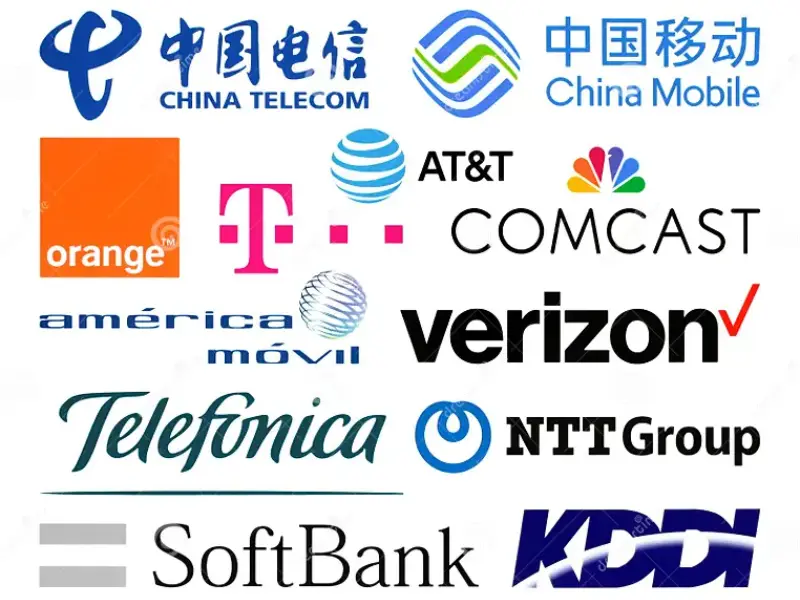- Telecom companies are organisations that provide voice transmission services or specialise in manufacturing telephones and related equipment.
- telecom companies enable individuals to make phone calls, send messages, browse the internet, watch television programs, and access a wide range of online content. They also support businesses by providing networking solutions, cloud services, and other technologies that facilitate collaboration, data sharing, and access to remote resources.
- According to Dun&Bradstreet and the company’s official annual report, the top five global telecom companies ranked by the latest revenue data as of January 2024 are China Mobile, Verizon, AT&T, Deutsche Telekom and Nippon Telegraph and Telephone.
Telecommunications companies, also known as telecommunications companies, are telecommunications service companies, including communications service companies.
What does a telecom company do?
In a broader sense, a telecommunications (telecom) company is an entity that facilitates communication over long distances through various means such as telephone, television, or the internet. These companies provide the infrastructure and services necessary for people and businesses to communicate, access information, and conduct transactions across geographical boundaries.
In real-life practice, telecom companies are organisations that provide voice transmission services or specialise in manufacturing telephones and related equipment. However, manufacturers of networking hardware, routers, switches, etc., are more likely to refer to themselves as data networking or networking companies.
Telecom companies offer a range of services including voice communication, data transmission, wireless communication, television services, and internet access. They build and maintain networks, both wired and wireless, that enable these services to be delivered to customers. This infrastructure includes cables, satellites, towers, and data centres, among other components.
By providing these services, telecom companies enable individuals to make phone calls, send messages, browse the internet, watch television programs, and access a wide range of online content. They also support businesses by providing networking solutions, cloud services, and other technologies that facilitate collaboration, data sharing, and access to remote resources.
Telecommunications companies are capital-intensive service industries and are an important infrastructure in a country or region, with the largest capital investments being in physical telephone networks and telecommunications equipment.
Also read: HGC: Bringing cybersecurity assurance to Hong Kong’s telecommunications industry
Therefore, in many countries, telecommunications companies are licensed enterprises, and the proportion of foreign funds will be capped. In some countries, the telecommunications companies are state-owned enterprises or government-dominated enterprises.
Top 5 global telecom companies
According to Dun&Bradstreet and the company’s official annual report, the top five global telecom companies ranked by the latest revenue data as of January 2024 are China Mobile, Verizon, AT&T, Deutsche Telekom and Nippon Telegraph and Telephone.

Note that only revenue generated by the telecommunications industry is calculated here, revenue realised by other business units that the company may be involved in is not considered and the revenue is expressed in U.S. dollars.
1. China Mobile
Revenue: $140.3 billion
Headquarters: Beijing, China
China Mobile is the world’s largest telecommunications company by revenue, by far the largest telecommunications company in Asia, and the world’s largest communications provider by subscribers, serving nearly 1 billion mobile customers and more than 200 million broadband customers worldwide. The company was founded in 1997. China Mobile is its main brand, and in addition to the domestic market, the Chinese state-owned company is also present in Japan, Thailand, Singapore, Canada, Italy and the United Kingdom through its CMLink brand, and Pakistan through the company’s Zong 4G brand.
2. Verizon
Revenue: $134 billion
Headquarters: New York City, New York, USA
Verizon is the second-largest telecommunications company in the world and the largest outside of Asia. The US company was founded in 1984 when the former AT&T was legally required to be broken up, and until then it had enjoyed a monopoly in the US telecommunications market. Today, Verizon is the leading wireless telecommunications subscription service provider in the United States. In addition to its main brands, Verizon also owns an all-digital app-based wireless service provider Visible and a prepaid wireless service provider Tracfone. Verizon has hundreds of millions of customers in the United States who subscribe to its service through its three brands.
3. AT&T
Revenue: $121.7 billion
Headquarters: Dallas, Texas, USA
AT&T is the third largest telecommunications company in the world. The AT&T brand has a rich history dating back to the invention of the telephone, although AT&T was formed in its current form in 1983 by a legally required divestiture, a move that broke up the telecommunications monopoly enjoyed by AT&T’s predecessor companies in the United States. Status. AT&T is the leading wireless subscription service provider in the United States. The US company has now expanded beyond the US and has hundreds of millions of users around the world. AT&T also owns Cricket Wireless, a popular prepaid wireless service provider that serves about 10 million customers in the United States.
Also read: AT&T’s ORAN shift: A game-changer for telecom giants
4. DEUTSCHE TELEKOM
Revenue: $120.3 billion
Headquarters: Bonn, North Rhine-Westphalia, Germany
Deutsche Telekom is the fourth-largest telecommunications company in the world and by far the largest in Europe. The company was founded in 1995 after the German government privatised the telecommunications industry. Today, the German company operates in several countries in Europe and the United States under its two main brands, Telekom and T-Mobile. In Germany, Deutsche Telekom also offers discounted prepaid wireless communications services through its Congstar brand and digital-only application services through Fraenk. It also owns Greece’s largest telecommunications company, OTE, and its main brand, Cosmote, and also co-operates with the European Aviation Network, which provides WiFi connectivity to passengers within the EU as well as on Norway + Switzerland flights.
5. NIPPON TELEGRAPH & TELEPHONE
Revenue: $97.2 billion
Headquarters: Tokyo, Japan
Japan Telegraph and Telephone Company (NTT) ranks fifth among the world’s largest telecommunications companies. The company was founded in its current form in 1985 after the privatisation of Japan’s telecommunications industry, which was previously operated by the US company AT&T. NTT is by far the largest and dominant telecommunications company in Japan. The company also offers many information and communications technology (ICT) services in Japan and abroad, and its main consumer subscription business is conducted through its main brand, NTT Docomo, which stands for “Mobile Network Communications.”

